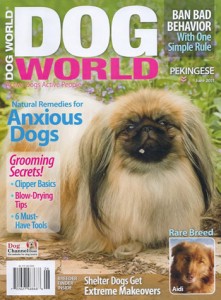As seen in the June 2011 issue of Dog World magazine.
 Unfortunately, behavior problems in dogs are becoming more and more common. The good news is that natural cures are proving to be very effective. A dog’s anxiety can surface in a bewildering number of ways – from cowering in a closet for hours during thunderstorms to shredding the carpets or subjecting the neighbors to non-stop howling whenever he’s left alone. Holistic alternatives can help your dog cope with stressful situations, and some simple behavioral modification techniques used in conjunction can reinforce desirable behavior patterns.
Unfortunately, behavior problems in dogs are becoming more and more common. The good news is that natural cures are proving to be very effective. A dog’s anxiety can surface in a bewildering number of ways – from cowering in a closet for hours during thunderstorms to shredding the carpets or subjecting the neighbors to non-stop howling whenever he’s left alone. Holistic alternatives can help your dog cope with stressful situations, and some simple behavioral modification techniques used in conjunction can reinforce desirable behavior patterns.
The feelings experienced by our dogs are pretty much the same kinds of feelings that we have. Every dog experiences a wide range of emotions. They can feel afraid, insecure, and worried. It’s often difficult to understand why a particular dog is experiencing unwanted or unpleasant emotions because we simply can not sit down and have a chat with our dogs. However, significant changes in routine have been known to trigger anxiety disorders in some dogs.
When pets are left alone for the majority of the day, they may get frightened, bored, lonely or anxious. Dogs may exhibit destructive behavior simply because they’re uneasy. An unwanted behavior might be an outlet for nervous energy. It’s important to understand how much our dogs need their own quality time with their families. If you plan a daily routine that allows you to give your pets some undivided attention and love, you’ll probably find that you enjoy it as much or more than your dogs.
Nutrition can also affect disposition
The brain itself has very high energy and nutrient needs. B vitamins are collectively known as “stress vitamins” because they help in high stress situations. Vitamin D is also involved in healthy brain development. There are receptors for Vitamin D in your dog’s brain and recent research is discovering a link between Vitamin D3 and mood. Vitamin D activates receptors on neurons in regions of the brain implicated in the regulation of behavior. Importantly, vitamin D increases serotonin production. Serotonin is a neurotransmitter that affects the ability to handle stress and feel content and is believed to play an important role in anxiety. Calcium and Zinc also play important roles in brain and nerve function. A complete and balanced supplement such as Deserving Pets VITAL VITIES will provide balanced vitamin supplementation for your dog.
Melatonin and Endorphins
Dr. Linda Aronson, DVM, of Tufts University School of Veterinary Medicine says that melatonin is effective in calming dogs with anxiety. Melatonin actually works with endorphins, special stress-reducing chemicals produced by the immune system. Melatonin enhances the effect of endorphins; thereby, aiding the ability to withstand stress, and promoting a greater sense of general well being. Give dogs weighing less than 10lbs 1mg of melatonin twice a day. Dogs weighing 35 to 100lbs should receive 3mg of melatonin twice a day, and you can give 6mg to dogs weighing over 100lbs. Aronson cautions people to use plain melatonin tablets not sublingual, time-release, or capsule forms.
The Thundershirt
The following solution may seem unusual, but dog owners swear by it. Bonnie Valiente, VMD, admits feeling dubious at first when she learned about the product. Since then she’s guided hundreds of dog owners who have contacted her at www.shopbff.com and they’ve been overjoyed with the results.
The Thundershirt makes dogs feel like they are being caressed or held. It’s used to help reduce anxieties such as separation anxiety, obsessive barking, fear of thunder or fireworks, destructive behavior, and social phobias that include fear of new people or new pets. Dogs immediately relax when the shirt is placed on them and they find the feeling comforting. Thundershirts have Velcro safe closures and they come in all sizes.
Homeopathy, Herbs and Flower Essences
A specific homeopathic remedy, Ignatia, is a wonderful remedy for emotional stress and loneliness and it has proven very helpful with separation anxiety. You can purchase this remedy at many Health Food Stores. Give a pellet or two to melt in your dog’s lip pouch three times a day for a few weeks. A Chinese Traditional Herbal Formula called Shen Calmer often works very well, especially, in conjunction with behavior modification. A flower essence blend called Separation Anxiety, made by Spirit Essences, can be added to the drinking water every day.
Q&A
Q: I have a black lab that I love dearly. He is super sweet and listens very well. Our only problem with him is that when we leave he ruins things, rips up books, eats things, and just makes a horrible mess. I now get fearful of what our house will look like when I open the front door. What should do? Is there anything I can do? He is only one year old so maybe he’ll grow out of it. Any advice on this would be greatly appreciated! We love him but cannot have everything in our house eaten.
Best,
Carly
A: If he is an only pet, a companion dog or cat may help by keeping him company when the family leaves. You can leave him with safe bones to chew and/or fill appropriate toys, like the Clever K-9, with cheese or snacks so he can spend time searching these out to keep busy. Soothing classical music left on in the background may help. Make sure he gets some heart pumping exercise, playtime, and TLC. Exercise often helps burn off excess nervous energy. Additionally, you can leave a noise sensitive recorder on during the day and listen in to discover if any particular event, such as the mailman, triggers the unwanted behavior. You can also go through all the motions of leaving without leaving. Don’t give your dog special attention before you leave the house. After you have done this for several sessions, you can leave the house for short periods of time and then gradually increase the time period you are absent.
Here’s a recipe for a calming Diet. Turkey is high in L-Trytophan (one reason why we mellow out after holiday meals), while barley and chamomile calm the nerves.
2 cups turkey, cooked
2 cups barley cooked with 3 eggshells
2 teaspoons chamomile flowers made into a tea with ¼ cup water
2 teaspoons parsley
2 cups of cooked carrots
1/3 cup olive oil
Mix all ingredients together and serve. Adjust portion for size of dog.
From Dr. Khalsa’s Natural Dog
An article with references to the use of melatonin in dogs can be found in the Journal of the American Veterinary Medical Association, Volume 215, No. 1, July 1999. “Vet Med Today: Animal Behavior Case of the Month” was written by Linda Aronson, DVM, MA; from the Department of Clinical Studies, School of Veterinary Medicine, Tufts University, North Grafton, MA.

 About Dr. Khalsa
About Dr. Khalsa